| |
"I feel very strongly that it's not enough just to live in the world as it is, to just kind of take what you're given and, you know, follow the things that adults told you to do, and that your parents told you to do, and that society tells you to do. I think you should always be questioning. I take this very scientific attitude, that everything you've learned is just provisional, that it's always open to recantation or refutation or questioning, and I think the same applies to society. Once I realised that there were real, serious problems – fundamental problems – that I could do something to address, I didn't see a way to forget that. I didn't see a way not to." |
| |
Aaron Swartz |
If you're not a computer programmer or an internet development enthusiast (I'm reluctant to use the word geek – there's a lovely extract from the Daily Show in this very film that concisely explains why), then there's a good chance you'll have never heard the name Aaron Swartz. If history had been kinder then I have the distinct impression that sooner or later you damned well would have done. Swartz was a kid of the computer generation, someone exposed to computers from such an early age that he saw these machines as being as much a part of the household as the TV or the stereo. And Aaron was smart. Fuck, was this kid smart. You want an example? Okay, but first a little preamble.
I was not a child of the computer age, and did not encounter my first home computer until I was in my early 20s. It was a Sinclair Spectrum, all rubber keys and crude dotty typeface and 16K of memory, and it belonged to a close friend who writes for this very site. Camus was working for the BBC back then and I was staying with him for a few days. When he went off to work, he left me with the Spectrum and a handful of games to play with if I fancied. We'd laugh at them now. One was a flight simulator whose graphics consisted of a screen split in two horizontally, the top half blue (sky) and the bottom green (ground) and that ran at something like 4 frames per second. I could barely keep the virtual aeroplane level, let alone land it. Quickly tiring of this, I investigated BASIC, the user-friendly programming language that came with the computer. By the time Camus got home that evening, I'd programmed it to play the main theme from Halloween in musical beeps. I was hooked. I soon had my own Spectrum, and despite getting my hands on some far better games (I still have the fondest of memories of Skool Daze, Knight Lore and Lunar Jetman, amongst others), I was fascinated by what you could do with BASIC. Eventually I got adept enough to program a database to catalogue my video collection, one that enabled me to list the contents by any criteria and which even had a crude search facility. Pretty cool, huh? Yeah? Well try this.
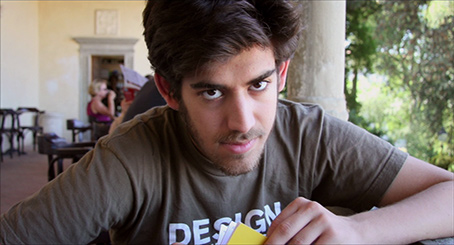
Two years before the birth of Wikipedia – the online encyclopaedia that is apparently now the single most frequently accessed web site on the planet – Swartz had the idea for just such an online repository of knowledge that its users could contribute to and edit (sound familiar?), and promptly set about programming it and uploading it to the web. It was called The Info Network, and at the time of its launch its inventor and sole programmer was just 12 years old and had created the site on an old computer in his bedroom. How's that clunky BASIC database looking now? The site won Swartz the ArsDigita Prize, an award given to young people who create "useful, educational, and collaborative noncommercial websites". At 13 he began contributing to the development of RSS, which was to become the standard format for web based news and information feeds. Subsequently he became involved with the establishment of Creative Commons, the Markdown publishing format, and the social media site Reddit. And this is just a small sampling of his impressive range of achievements.
Now before I go on, you may well have picked up that when I talk about Aaron it's always in the past tense. There's a reason for this, one that doesn't act as a spoiler as the film under discussion here is up front about this fact. On 11th January 2013, the 25-year-old Aaron Swartz took his own life. At his funeral, Aaron's father openly accused the government of killing his son. The story of this remarkable young man and the circumstances that led to his untimely death is the subject of Brian Knappenberger's fascinating, moving, saddening but still ultimately inspiring documentary, The Internet's Own Boy.
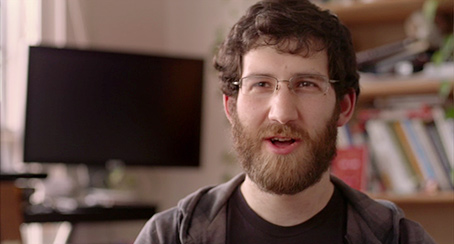
It becomes clear from an early stage that, in spite of the considerable commercial success that his intelligence and instinctive understanding of the complexities of programming could easily have brought him, Aaron was never interested in using his talents for monetary gain. Initially driven by a fascination for what he was learning, it was his disenchantment with high school that first awakened in him the need to question and confront the society in which he lived. In a 2010 interview for SpunOut.ie, included in the film, Aaron lays this out wonderfully:
"I was very frustrated with school. I thought the teachers didn't know what they were talking about, they were very domineering and controlling, homework was kind of a sham, and it was just like all a way to pen students together and force them to do busywork. And I started reading books about the history of education and how this educational system was developed, and alternatives to it and ways that people could actually learn things as opposed to just regurgitating facts that teachers told them, and that kind of led me down this path of questioning things. Once I questioned the school I was in, I questioned the society that built the school, I questioned the businesses that schools were training people for, I questioned the government that set up this whole structure."
It was at this point in the film that I really began to realise what a loss Aaron's death represents. Here was a young man who was challenging the foundations of a society in which he had the potential to thrive, not because he felt personally wronged by it, but because he was intelligent enough to see through the bullshit and be aware that there were practical and morally sound alternatives to what others were accepting as the norm. It was this attitude that led him challenge the impractical extremes of copyright law and become involved in the development of the Creative Commons alternative (look it up, people, you're probably using it without knowing), and later to found the online activist groups Watchdog.net and Demand Progress, whose most celebrated success was in helping to block the progress of the Stop Online Piracy Act (known as SOPA), a bill that would have severely impacted on the free and expressive nature of the internet as it stands today.
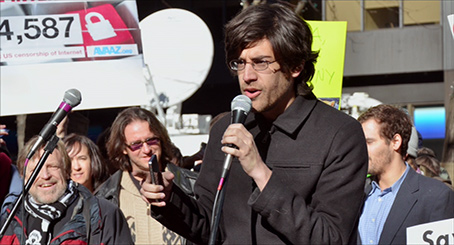
While this may well have piqued the interest of the American enforcement agencies, it was when Aaron used MIT's 'open campus' network to download millions of academic articles from the JSTOR subscription database that they really went after him. The thing is, he wasn't doing this for personal gain or with the intention of damaging JSTOR, it just irked him that the public were being asked to pay for access to what were essentially public documents. But in post-Wikileaks America, the Secret Service seem to be investing a disproportionate amount of effort targeting internet activists, and the zeal with which they hounded and prosecuted Aaron took a terrible toll.
There's nothing frivolously fancy or decorative about the structure or handling of The Internet's Own Boy, and a couple of reviewers have griped that it's a little too reliant on talking heads, but as far as I'm concerned it is they that are the heart and soul of the film. Aaron's father and brothers take us on a home movie illustrated trip through his formative years, and as Aaron's story expands considerably in scope, so do the range of interviewees, collectively bearing enthusiastic witness to every key event in his professional life. But the prize inclusion here is the footage of Aaron himself, who in interview comes across as the smartest, most socially conscientious and likeable guy on the block. This is someone you'd want to meet and debate with and learn from, a humanitarian and believer in freedom of expression whose justification for his beliefs and actions is so persuasive and logic-based that it's nigh-on impossible not to regard those who sought to silence him as morally unsound and vindictive by default.
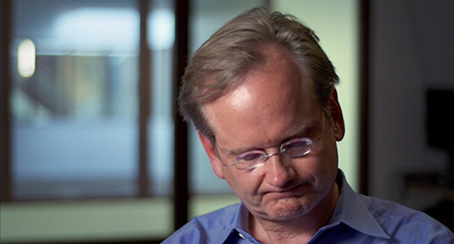
Although the fact that Aaron was driven to his death is briefly discussed at the front end of the film, it still provides the story with an emotional climax, with almost none of those interviewed able to talk about what happened without faltering in their speech or fighting back tears. Even a poetic eulogy written by Tim Berners-Lee – the inventor of the world wide web and a hero of Aaron's, not least because instead of trying to profit from a creation that could have made him a multi-billionaire, he gave it away for free – manages to tug at the heart strings without tipping into sentimentality.
But director Knappenberger – whose equally impressive 2012 documentary on the Anonymous hacker group, We Are Legion: The Story of the Hacktivists should also be on your watch list – knows how to end his story on a high note, leaving us with a powerful justification for the actions for which Aaron was prosecuted, and the inspirational words of his girlfriend Quinn Norton: "Aaron believed that you literally ought to be asking yourself all of the time, 'What is the most important thing I could be working on in the world right now?' And if you're not working on that, why aren't you?"
The 1.85:1 anamorphic picture here is strong in all the ways a good DVD transfer should be, with the contrast, colour and detail all spot-on for a standard-definition transcode of an HD-shot and mastered original. High-def junkies will doubtless question why the film is not being released on Blu-ray, but I have no complaints with the presentation here.
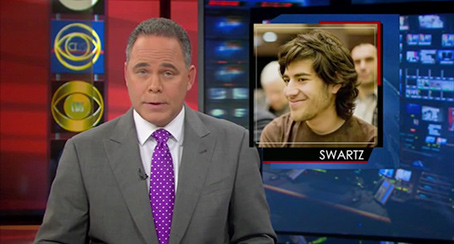
You can choose between Dolby 5.1 surround and Dolby 2.0 stereo. Both, as you'd expect, are clear, well mixed and boast an excellent dynamic range, although the stereo track, which spreads the interview voices across the front speakers and seems to have slightly crisper trebles and a noticeably lower bass response, feels a little less refined than it's 5.1 brother.
The only extra feature here is a Trailer (1:42), which you could argue that you don't really need if you have the movie itself in front of you, but it's a well assembled piece that captures the essence of the film rather well.
On the basis of this and We Are Legion: The Story of the Hacktivists, Brian Knappenberger is starting to carve a niche for himself as a hacktivist documentarian of some note. The Aaron Swartz story is a fascinating one and is compellingly told here, albeit from a resolutely partisan viewpoint, one I happen to share and am happy to champion. The lack of extra features is a shame, but the film itself is first-rate and this disc thus comes warmly recommended.
|